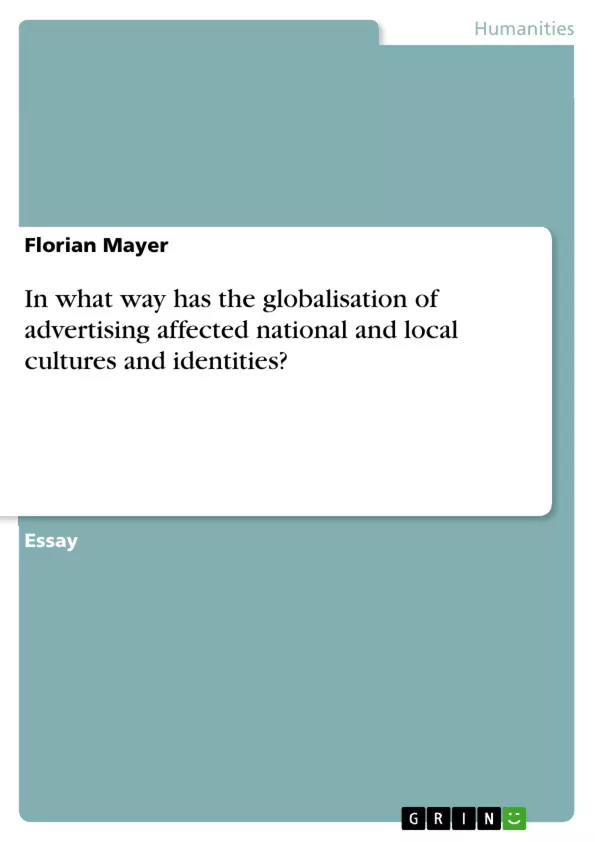It has been argued that individual and national identities are becoming increasingly fragmented under conditions of globalisation, that with accelerated global flows of commodities, culture and people, we become increasingly disembedded and rootless. It is argued here that amid this increasing fragmentation, or perhaps in reaction to it, certain narratives work to anchor national identities and local culture in what is perceived to be tradition. This paper examines the relationship between globalisation and the construction of national and local identities in the advertisements of several Western and non-Western countries, like Canada and Germany and Malaysia, Thailand and Ladakh in the western Himalayas. In this paper advertising is being seen as a part of the culture industries, which play an important role in the creation of community. In many scholarly accounts it has been asserted that globalisation and the spread of multinational corporations and their products and services are leading to a homogenisation of cultural diversity and to an increasing uniformity of tastes, fashions and thoughts around the world. The globalisation of advertising, which we are going to look at in the following pages, however, produces different outcomes for national and local cultures and identities in many cases.
Table of Contents
- Introduction
- Advertising as a cultural institution
- Advertising and the deconstruction of local identities
- Advertising and the construction of national and local identities
- Conclusion
Objectives and Key Themes
This article aims to analyze the complex relationship between globalization and the construction of national and local identities within the context of advertising. It investigates how advertising in various Western and non-Western countries, such as Canada, Germany, Malaysia, Thailand, and Ladakh in the western Himalayas, shapes and reinforces national identities and local cultures.
- The role of advertising as a cultural institution in shaping societal values and identities
- The impact of globalization on national and local cultures, particularly the potential for homogenization or fragmentation of identities
- The relationship between advertising and the construction and deconstruction of local identities
- The influence of advertising on consumerism and its implications for cultural development
- The use of advertising as a tool for nation-building and the creation of 'imagined communities'
Chapter Summaries
The Introduction sets the context by exploring the debate surrounding globalization and its potential impact on individual and national identities. It highlights the argument that global flows of commodities, culture, and people can contribute to fragmentation and the need for narratives that anchor national identities in tradition. The article then focuses on advertising as a key cultural force, drawing on various scholars' perspectives to demonstrate its significance in shaping cultural values, defining social roles, and constructing meaning.
The chapter on "Advertising as a cultural institution" examines the persuasive power of advertisements and their ability to articulate societal ideals and desires. While acknowledging the potential for advertising to perpetuate capitalist ideology, the chapter primarily focuses on its role as a cultural factor that shapes and reflects our lives. It emphasizes the significance of advertisements in defining product meanings and creating models for identity formation at both individual and national levels.
The chapter on "Advertising and the deconstruction of local identities" delves into the potential negative effects of advertising on local cultures, drawing on a case study of Ladakh in Nepal. This section highlights how the proliferation of Western television and advertising can undermine local self-esteem and displace traditional cultural practices with a "consumer monoculture."
Keywords
The key themes and concepts explored in this article include globalization, advertising, national identity, local culture, consumerism, cultural homogenization, fragmentation, cultural institutions, 'imagined communities', and the impact of Western media on non-Western cultures.
Frequently Asked Questions
How does globalization of advertising affect local cultures?
It can lead to cultural homogenization and uniform tastes, but it also triggers reactions where narratives are used to anchor national identities in perceived traditions.
Is advertising considered a cultural institution?
Yes, the paper argues that advertising is part of the culture industries, playing a vital role in creating communities and shaping societal values and social roles.
What is an 'imagined community' in the context of advertising?
It refers to the use of advertising as a tool for nation-building, creating a shared sense of identity and belonging among people who may never meet.
What happened to local identities in Ladakh?
The study highlights how Western media and advertising displaced traditional practices in Ladakh, potentially undermining local self-esteem in favor of a consumer monoculture.
Which countries are examined in this paper?
The relationship between globalization and identity is examined in Western and non-Western contexts including Canada, Germany, Malaysia, Thailand, and the Himalayas.
- Quote paper
- Florian Mayer (Author), 2003, In what way has the globalisation of advertising affected national and local cultures and identities?, Munich, GRIN Verlag, https://www.grin.com/document/13664



